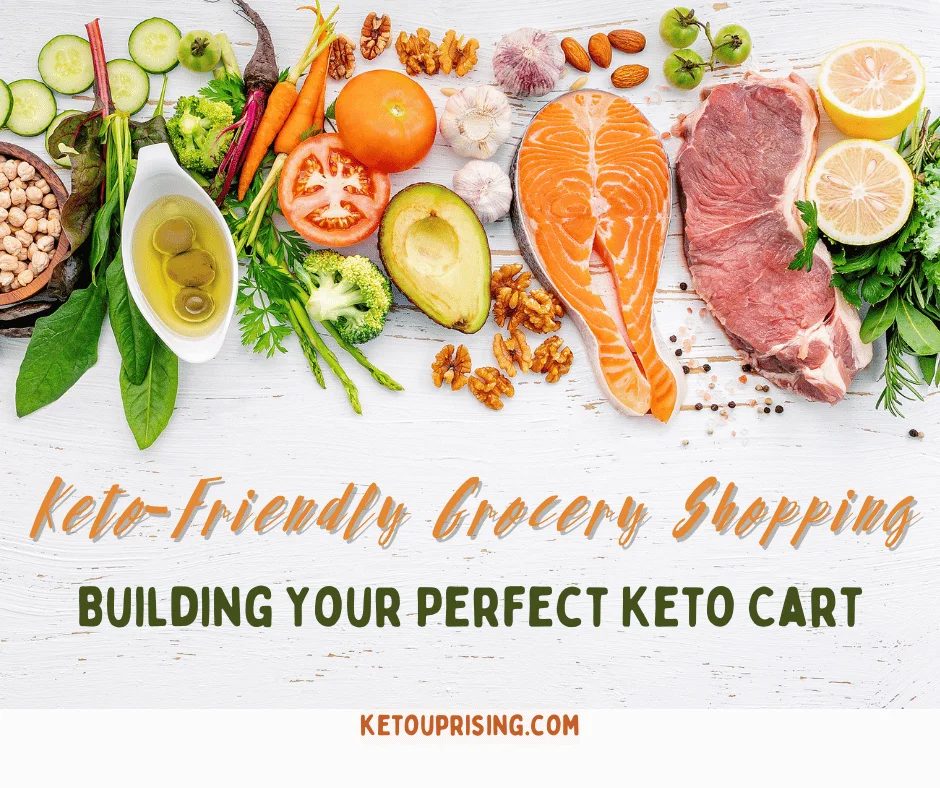Starting and sustaining a ketogenic lifestyle requires strategic grocery shopping. To maintain ketosis, every ingredient you choose should align with your macronutrient goals. In this guide, we’ll break down keto-friendly essentials for each meal, outline weekly and monthly needs, and help you build the ultimate keto shopping cart.
Understanding Keto-Friendly Ingredients
Before heading to the store, it’s essential to understand the key components of a ketogenic diet:
- Healthy Fats (70-75% of daily calories): Avocados, olive oil, butter, nuts, and seeds.
- Moderate Proteins (20-25% of daily calories): Meat, eggs, poultry, and seafood.
- Low-Carb Vegetables (5-10% of daily calories): Leafy greens, broccoli, cauliflower, and zucchini.
These categories will guide your shopping to ensure every item supports ketosis.
Breakfast Essentials: Start Your Day Right
A keto breakfast typically revolves around high-fat, protein-packed ingredients that are low in carbs. Here’s what you’ll need for the week:
- Eggs (Dozen): The ultimate keto breakfast staple. Use them for omelets, scrambled eggs, or egg muffins.
- Avocados (4-5): Rich in healthy fats and perfect for avocado toast (minus the bread) or avocado smoothies.
- Bacon (1 lb): Adds flavor and crunch to any breakfast.
- Unsweetened Almond Milk (1 Quart): Great for chia seed pudding or keto coffee.
- Chia Seeds (1 Pack): A versatile ingredient for pudding or smoothies.
- Keto Bread (1 Loaf): If available, adds variety to breakfast options.
Weekly Breakfast Grocery Costs: $20–$30
Lunch Staples: Keep It Light but Satisfying
Lunch is an opportunity to get creative while staying within your macros. Here’s what your shopping list should include:
- Leafy Greens (Spinach, Kale, Romaine) (3–4 Bunches): Use these as the base for salads or wraps.
- Protein (Chicken Breast, Ground Turkey, or Canned Tuna) (3–4 lbs): Ensure a protein-packed midday meal.
- Avocado Oil (1 Bottle): Ideal for salad dressings or pan-frying.
- Cheese (Cheddar, Feta, or Blue Cheese) (1–2 Blocks): Adds flavor and fat to salads or wraps.
- Low-Carb Wraps or Lettuce Leaves (1 Pack): Perfect for making keto-friendly wraps.
- Nuts and Seeds (Almonds, Walnuts, or Sunflower Seeds) (1–2 Packs): Use them as a topping or a quick snack.
Weekly Lunch Grocery Costs: $30–$40
Dinner Necessities: End the Day Deliciously
Dinner is often the most varied and fulfilling meal of the day. Your cart should include:
- Meat (Beef, Pork, or Lamb) (4–5 lbs): Essential for hearty dinners like steaks, roasts, or stir-fries.
- Seafood (Salmon, Shrimp, or Cod) (2–3 lbs): Provides omega-3s and protein.
- Vegetables (Zucchini, Cauliflower, Broccoli) (6–8): Ideal for sides, soups, or rice substitutes.
- Butter or Ghee (1–2 Sticks): Enhances flavor and adds healthy fats.
- Heavy Cream (1 Pint): Use for sauces or creamy soups.
- Parmesan Cheese (1 Pack): Perfect for keto Alfredo or as a topping.
Weekly Dinner Grocery Costs: $40–$50
Snacks and Desserts: Keep Cravings at Bay
Snacking on keto doesn’t have to be boring. Stock up on:
- Pork Rinds (2 Bags): A crunchy, zero-carb snack.
- Keto Bars (4–5): Convenient for on-the-go cravings.
- Dark Chocolate (85% or Higher) (1–2 Bars): Satisfies sweet cravings with minimal carbs.
- Peanut Butter (Unsweetened) (1 Jar): A quick snack when paired with celery.
- Fat Bombs (Pre-Made or DIY Ingredients): Mix almond butter, coconut oil, and cocoa for a quick fat boost.
Weekly Snack Grocery Costs: $20–$25
Building Your Weekly Shopping Cart
Here’s a sample cart for one week of keto-friendly eating:
| Category | Items | Quantity |
|---|---|---|
| Proteins | Eggs, chicken breast, ground beef | 12 eggs, 4 lbs meat |
| Fats | Butter, olive oil, avocados | 1 bottle, 2 sticks, 5 avocados |
| Vegetables | Spinach, cauliflower, zucchini | 5 bunches, 4 pieces |
| Snacks | Nuts, pork rinds, dark chocolate | 2 packs, 1 bar |
| Miscellaneous | Cheese, almond milk, chia seeds | 2 blocks, 1 quart |
Estimated Weekly Total: $120–$150
Monthly Essentials for Long-Term Prep
Planning for the month can save time and money. Stock up on non-perishables and bulk items like:
- Almond Flour (1 Bag): Essential for keto baking.
- Coconut Flour (1 Bag): A versatile low-carb alternative to wheat flour.
- Olive Oil (Large Bottle): A keto kitchen staple.
- Frozen Vegetables (4–5 Bags): Perfect for quick sides.
- Meat (Bulk Purchases): Freeze portions of beef, chicken, or pork.
- Cheese (Block or Shredded): Stays fresh for weeks.
Estimated Monthly Costs: $300–$400
Tips for Smart Keto Shopping
- Shop the Perimeter: Focus on fresh produce, meats, and dairy found along the outer aisles of the grocery store.
- Read Labels: Watch for hidden carbs in processed foods.
- Buy in Bulk: Save money by purchasing frequently used items like butter, oils, and meats in larger quantities.
- Plan Ahead: Avoid impulse purchases by sticking to a pre-written list.
A well-planned keto grocery list ensures you always have the right ingredients on hand to create delicious, nutrient-packed meals. By focusing on versatile staples, bulk purchases, and fresh produce, you can make your keto journey both convenient and budget-friendly.
Are you ready to transform your kitchen into a keto haven? Grab your list, head to the store, and start building meals that fuel your success!

